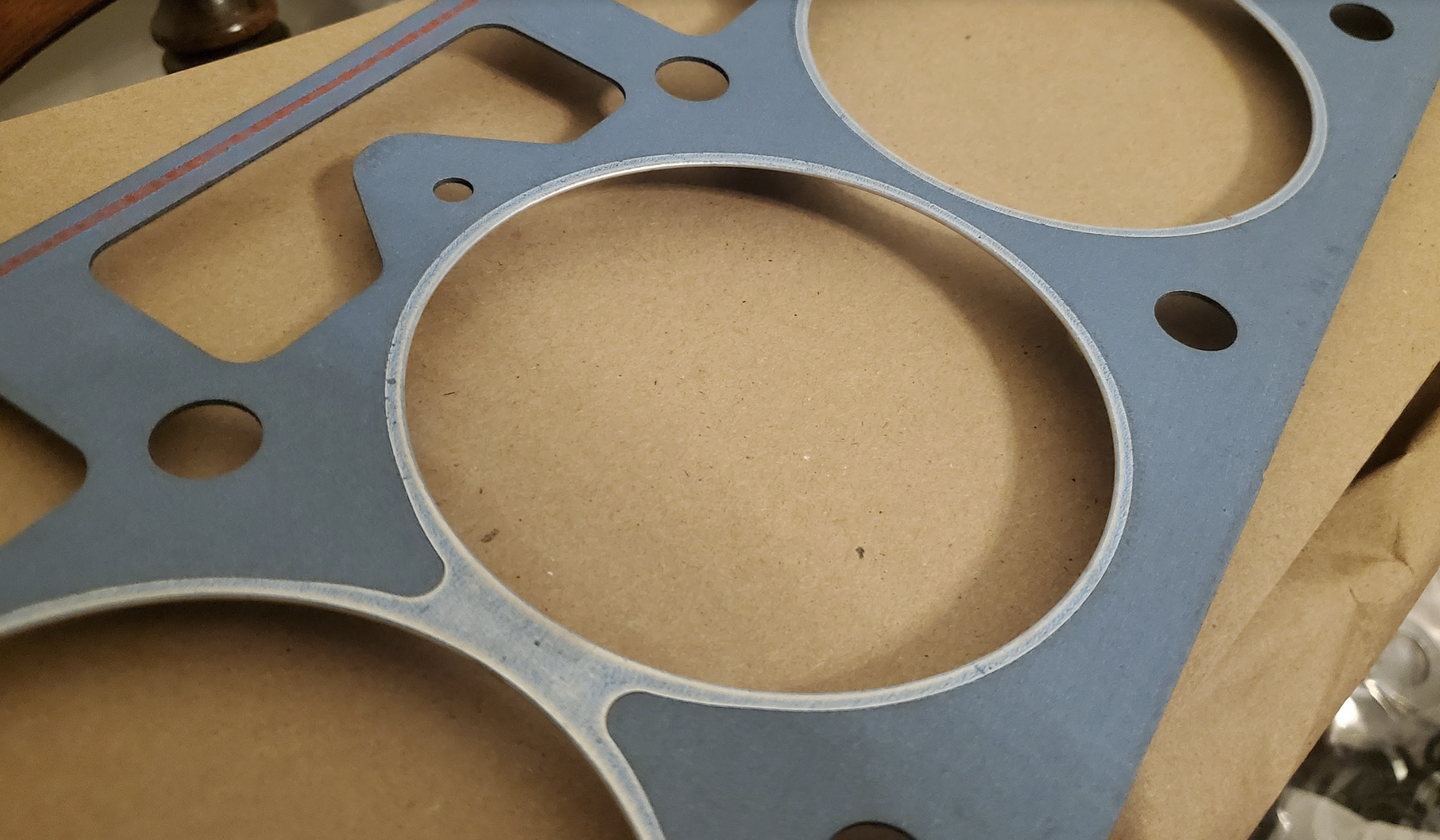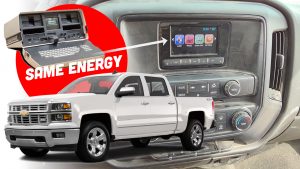Thump…..thump. Thump..thump. Thumpthump. My heart began racing as I put all of my might into lifting the cast iron cylinder head from the engine that had “blown up” a few weeks prior, just 20 minutes after I’d sold its host — a beautiful 1991 Jeep Cherokee — to a nice lady. I had sent an oil sample to a lab to try to understand what had happened, but the results were inconclusive. But now I was going to find out for sure. Here’s what I saw inside that dead motor.
Last night, my colleague Jason Torchinsky and I spent about three hours tearing apart the 170,000 mile Jeep 4.0-liter inline-six in the 1991 Jeep Cherokee that I had sold to a nice lady who had driven all the way from Chicago for a Jeep that would only take her 20 miles towards home before overheating. I was initially worried that the “unkillable” Jeep engine was toast, since it had such a severe knock, but then I learned that the noise was just the water pump banging against the engine block.
Still, the engine didn’t run properly, and had no compression in the middle cylinders. So I sent an oil sample out to Blackstone Labs, who found elevated aluminum and iron content, indicating piston and piston ring/camshaft wear. The lab had found no indication of coolant in the oil, which was odd, as multiple adjacent cylinders without compression is almost always a symptom of a failed head gasket (which tends to cause coolant to leak into the oil). Maybe the head gasket wasn’t the issue, and those center pistons had somehow failed? This wouldn’t be the first time I’d heard of a Jeep 4.0 piston breaking to pieces.

I’ve lost a lot of sleep over this, since I really don’t feel like swapping an entire motor, especially not by the June 1 deadline that the buyer gave me (Yes, she still wants the Jeep, and she needs it soon). So to improve my nightly rest, Torch and I finally yanked the head off the motor yesterday. It’s a job I’ve done far too many times, as AMC’s most legendary motor is— if I’m honest — deeply flawed when used in an XJ, a vehicle with a marginal cooling system.
This head extraction was easier than ever, since I had an extra set of hands and great weather on my side.

We removed the electric fan and airbox, undid the exhaust and intake manifold, took off the power steering pump, set aside the fuel injector wiring harness, popped off the spark plug wires, unbolted the thermostat and water pump (these weren’t strictly necessary to get the head off, but I’m replacing both), lifted the valve cover, and then loosened all the cylinder head bolts. From there, I slid a breaker bar into the thermostat hole in the head, and lifted up. After quite a bit of pushing, the cylinder head finally popped up, revealing my engine’s six cylinders:
Here’s a look at the engine just before head liftoff, but after we’d removed the intake and exhaust manifold (which you can see there along with the dangling injector harness), as well as the power steering pump, valve cover, thermostat, and airbox:

Here you can see the valve cover and intake manifold:

Once we had the head off, we faced the moment of truth: Would there be catastrophic damage, or was this truly just a head gasket failure?
By the grace of the car gods, the pistons all looked to be in good shape, though the bridges between cylinders two and three, three and four, and four and five were all covered in coolant. You’ll also notice that there’s coolant in cylinder five, sitting atop the piston:



With coolant getting into the cylinders, and oil getting quite hot, you may wonder if there’s any damage to the cylinder walls. Let’s have a look:

Cylinder six does show a bit of vertical scoring on the cylinder wall, but touching it with my fingernail reveals that it’s quite shallow (undetectable, really). Having opened up a 4.0-liter straight six before, this isn’t that abnormal, and I don’t think it’s something to worry about. The remaining visible cylinder walls all looked nice:

Let’s have a peak at the failed head gasket:



It’s hard to tell how much of the damage occurred during cylinder head extraction, but you can see some bent fire rings (that’s the silver ring around the cylinder bore hole). The image below shows how a new gasket should look. Again, it’s hard to see exactly where the failure occurred, but it clearly did, as coolant was able to pour into the cylinders and cover the bridges between the cylinders (and this didn’t happen during head-removal, as the head was pretty much completely devoid of coolant). I wouldn’t be surprised if the head is warped, allowing coolant to travel between it and the gasket.

Anyway, the cylinder head now sits in the back of my Jeep. Tomorrow I’ll dump it off at the machine shop, where a 350 pound dude will check the thing for cracks, find them, and then I’ll be removing the head from the spare engine I have in my garage. That head will be checked and then shaved flat. Then Torch and I will reinstall it and pray that this Jeep runs like a dream so I can finally sell it, and bring my fleet down to a reasonable number of cars. I’m not sure how many exactly, which is kind of an indication that maybe it’s still too many, but let’s just ignore that.









Just look at your hands young men! I started wearing Nitrile gloves when do all my car work. Makes life much easier…and I can just take pair off and go in for sandwich or use my cellphone without any mess.
For example: 400 count at Costco is $40 ! but that only works out to $.10 for each glove. Worth it!
https://www.costco.com/kirkland-signature-nitrile-exam-gloves%2C-400-count.product.100497804.html
The 9 Mil gloves @ Harbor Freight are my go to:
https://www.youtube.com/watch?v=cAMLa5ZC-B4
I see it has a (Dorman?) aftermarket exhaust manifold. The OEM ones always crack…always. My theory is the often-failing motor mounts. David, please please use those motor mounts I sent you to replace the likely-perished ones on that XJ. It’s such an easy job and most people ignore it, which I truly believe causes issues due to motor movement under the hood. I also believe that can contribute to head problems with the non-TUPY heads on later models. ‘Cause nothing good happens from an engine flopping around.
The videos really added to the explanation. Thanks very much! This was really interesting!
“and bring my fleet down to a reasonable number of cars. I’m not sure how many exactly, which is kind of an indication that maybe it’s still too many, but let’s just ignore that.”
LOL! Yep, there it is 🙂
Glad it was relatively good news upon teardown!
THE SAGA CONTINUES!!!
rootwyrm, you should be writing tech articles for The Autopian!
That’s exactly what I was going to say. You beat me to it. Anyway, don’t forget to check the pfetzer valve and have some extra 50 weight ball bearings available.
Son of a Monkey? Jimminy Cricket? Gee Whiz? Definitely keeping this family friendly I see
DT and JT need to make an official autopian t-shirt with a picture of a random oddball tail light and the random quote “son of a monkey” underneath it and sell it on the merch shop. i’d buy it instantly.
I don’t think the words “a beautiful 1991 Jeep Cherokee” should be next to each other.
Glad it’s getting fixed, hope it goes well from here on out. Echoing other commenters, you should do a writeup about how to improve the XJ cooling system. I remember buddy’s having repeated problems with theirs back in the day. It seemed we were always doing a thermostat, water pump, radiator, or getting balls-deep into it like you are now.
So, a somewhat off-topic question for our Editor-in-Chief: Have you ever thought about doing a stroker engine for one of your Jeeps? They seem to be pretty popular in the Jeep community, and should be a walk in the park for a man of your skills.
I know you love that inline 6, but could you love it more with more power? It might make for a fun project (cough, cough, CONTENT, cough, cough).
Glad to see it is on the mend.
Does the person who bought it before have any interest in it? Just curious if she wants it or has washed her hands of it.
“I’ve lost a lot of sleep over this, since I really don’t feel like swapping an entire motor, especially not by the June 1 deadline that the buyer gave me (Yes, she still wants the Jeep, and she needs it soon).”
This was right below a picture of Tracy and Torch mugging for a selfie with greasy hands, so likely you were reading in a trance at that point.
Most likely. I sometime skim to the details. 🙂
As a cooling systems engineer, what would improve XJ cooling? Does it need a larger radiator?
I have wired more than 1 XJ electric fan to a toggle switch because the thermostat controlled switch failed. This works best for people who understand the importance of watching temperature.
I put mine on a toggle and added a shutdown timer so I can run it for a couple minutes after I turn the Jeep off. That plus the hood vents really helps the heat soak.
It needs a larger radiator. DT posted a video somewhere on social media showing the tiny radiator in the XJ vs the large one in the ZJ. He said the XJ radiator was designed for an I4 engine and the ZJ for a V8.
I defer to your experience with this motor, however there’s a flaw in your logic. Not many straight six engines are prone to blowing head gaskets. In fact, the opposite is true, L6 engines are fairly tolerant of overheating.
Said another way, if the problem was caused by inline longitudinal engines with mechanical water pumps being prone to overheating, why dont they all blow? Slant 6. Cummins. Every semi truck.
I only ever owned one 4.0. It came to me with a blown head gasket, and I sold it with a blown head gasket.
What would happen if the 5 plug were tapped, run a water line to an electric thermo-switched pump, then continue to a Y fitting on one of the front hoses?
Very interesting
While I might not want to live on the same street as you DT (property values and all) I wouldn’t mind being a short drive away to come lend a wrench to such exploits.
He’s actually on a main road, so it’s not actually as much of an issue as you’d think. I’d wager the sheer noise from the four lanes (plus center turn lane) of rather constant traffic (which opens up into six lanes with boulevards just past his place) detracts more from property values than too many vehicles placed strategically around his property.
@MP81
“vehicles placed strategically around his property.” don’t you mean — vehicles placed haphazardly around his property.
Agreed. Most of my head failures have NOT had milkshake. BUT they have had trace amounts of coolant in the oil. Granted, they’d been driven more than 25 miles… So this I guess isn’t a surprise. I might have expected SOME coolant in the oil as was the case in all of my other head-crack failures, but fair enough.
I’ve got two heads ready to rock.
DT – you need to get this guy to write articles! This is the deep dive I come here for… and it’s in the comments!
100% agree- this is column-worthy stuff right here.
Right? I remember reading a dissertation-long comment at the old site talking about the nature of Eagle Hemi heads and found it very interesting. Hire this guy as a guest writer, I’d read whatever he puts out.
This is awesome, and I’ve learned something new today. I was wondering why they looked so clean and shiny. Articles and the added insight like this are why this site is so great!
I’m stealing the phrases “Dumber-Chrysler” and “EWAGs”.
Where’s the YT video? You two could make a series of these videos. Call it American Mighty Car Mods.
I’d go with ‘Mighty Car Mooks’.
Yes, and nobody need worry, when they’re done fixing all the shitboxes between them, they can start fixing up winners from Shitbox Showdowns, to be sold or given away as charity.
Yay teamwork!
Yes, yea teamwork! It’s no fun trying to take off and replace that 65 pound cylinder head by yourself.
I do trim some of the excess threads off the top of bolt 14 so I can insert the bolt after the head is in place – I’ve never had any luck holding it up with tape.
Yep, I love an Inline 6, but maneuvering cylinder heads, intakes etc is a struggle. Long and heavy, no sexual pun intended.
With my current pickup, it’s set so far down in the gigantic engine bay meant to accommodate 454s, it’s really a challenge at times.
Try a redneck lifting rig. Ford 5.4 Triton heads are very big and surprisingly heavy for aluminum so I put a 2×4 across the fenders and used a ratchet strap to raise and lower the heads. In addition to being awkward they have to be lowered onto the locating dowels dead straight or you get head gasket problems.
Anytime buddys and (presumably) beer are involved, a good time is sure to be had!
Not bad 🙂
As i recall you predicted this outcome?
It got a bit confusing at the end.You’re planning to use another head ,but are getting the original
crack tested out of curiosity?
I read it as a pessimistic, “if it fails and cracks are found (and they will be) then I’ll be forced to use the other head, which will have to be shaved prior to using it in the XJ being sold”.
Id say it’s worth a few bucks to at least see if this head is salvageable. That beats tearing your spare engine apart
remember, the pack rat throws nothing out